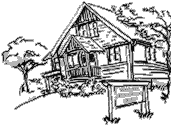Living in Transition – Barbara Ziegenhagen
Barbara Ziegenhagen was the scheduled speaker at Semi-Programmed Meeting for Worship on April 19, 2015
A little over three years ago my husband and I moved from a 2300 square foot house to an 850 square- foot apartment. We eventually found new homes for the belongings that we no longer needed or simply couldn’t fit into our new space. All except for four boxes: my memorabilia which I had carried through at least eight moves in my life. Boxes which held scrapbooks, scraps from one event I had experienced or another that I simply put in a little box in my closet. When it filled, I put the contents in a bigger box, and I did this over and over. Recently I decided to start going through these boxes and pare them way down. I found various markers of my life: my birth certificate, pictures of my childhood friends, papers I had written in high school about my aspirations in life, reflections in letters from friends, records of dedicated participation in various organizations, and poems and essays I had written which documented my changing faith and direction.
After sessions of sifting through these things I often left the study feeling a combination of celebration, disturbing sadness, and confusion. “That was me. Is it still me? Where am I now? Have I lost my passion for life? A meaningful direction? Do my changing priorities reflect loss of competency? Selfishness?
When I was a teenager I found a quote that resonated with my view of life and I put it under the glass on my dressing table. It said: “My life is God’s gift to me; what I do with my life is my gift to God.” I felt with such clarity and passion that for me that meant to be of service to others. I dreamed of becoming a social worker like Jane Hull or a missionary like Albert Schweitzer. I accepted positions of responsibility in organizations which I saw as opportunities to be of service: Blue Tri, Methodist Youth Fellowship, camp counselor, co-creator of a recycling group in the 60’s, my churches, the School Board in Ely, etc. etc. I felt needed and competent. More often than I like to admit, I took responsibility because I simply felt I should or just because I could.
But now, just what will be my gift to God? I am at another time of transition. My body is older and is changing in energy level and functioning. My family members and our relationships to each other continue to change. How can we create new ways of relating which reflect love and enrich both of us? I realize that, in deed, my days left on earth are limited. I have some new priorities and values. It is uncomfortable to be in times of transition where I am wanting to let go of some ways I live, but I haven’t yet discovered the new.
A few weeks ago my T’ai Chi teacher, a source of great wisdom for me, was explaining that it did not suffice just to memorize the moves, the postures of the T’ai Chi form. If we did, we would simply be mechanical people trying to replicate a move exactly. There would be no life in it. He said that each time we practice the form, if we listen to our internal teachers, each movement is experienced anew. We are not just trying to copy the teacher, but we are aware of the movement of energy within us and letting it move through our bodies.
My ears perked up and I heard, “You cannot memorize or program how to live. You must listen to the Great Source, the Spirit which is in you.” Some of my old ways of life have taken on a mechanical form. To really experience the precious gift of life in me I have to want my present experience from the inside whether it is joyous or sad. I really can only experience my life in the NOW. All I can do is listen, be aware and open. If my response is to flee the unpleasantness of this moment I am moving away from life and responding in a mechanical way.
As I listen — with no preconceptions of what I will find — I sense subtle stirrings from within but stirrings that are not created by me. They are rustlings of something timeless, a Greater Reality, the Source of Life itself. Parker Palmer, a contemporary Quaker educator, said in LET YOUR LIFE SPEAK, “Before you tell your life what you intend to do with it, listen for what it intends to do with you.” So listening from and to the inner voice is where I need to start.
Thomas Kelly, one of those wise Quakers said in A TESTAMENT OF DEVOTION, “Our task is to call men to be still and know, listen, hearken in quiet invitation to the subtle promptings of the Divine. The possibility of this experience of Divine Presence, and its transforming and transfiguring effect upon all life – this is the central message of Friends.”
